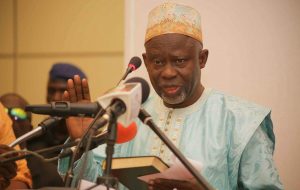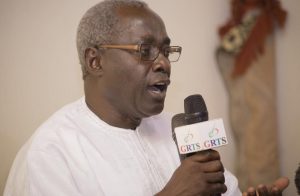
(JollofNews) – First of all it is recognized that there is total agreement that the members of the Coalition should remain under the Coalition to contest the forthcoming National Assembly elections. The question is what approach is the better option to take. I have listened to the two respective narratives of both Halifa Sallah and Ousainou Darboe. My take is that Ousainou’s narrative sells better. Here are my reasons.
Fielding independents would require those candidates to resign from their parties in order to contest. What happens when that candidate loses his or her election? It would mean he or she would have to re-apply to join the party again. Even if one wins the election, at the end of one’s tenure one would have to re-apply to rejoin one’s party since you have resigned. This is an inconvenience that is not necessary and costly.
Secondly, a group of independents would be difficult to manage if there is a crisis because all of them are equal under the Coalition. One would have to appeal to them individually and collectively to get comprises and agreements. But if they are in the Assembly under their party tickets, one could directly engage the parties to seek a common position. Therefore this is a one-stop shop arrangement that is cheaper than going round multiple shops to get one single item. This is also risky because you may not get what you want. Thus Independents do not necessarily imply unity.
Thirdly, with the Independents, it means such National Assembly members would be limited in the way they can interact with their parties because they resigned from their parties. The idea of Independents provides a clear sense of independence indeed such that even though they are under the auspices of the Coalition, yet the Coalition is not a single party. Hence in the event of disagreements or misunderstandings, these independents have a choice to either listen to their original parties or to stick to their individual positions or none of the above hence the inability of the Coalition leadership to manage. But if they were elected as party representatives, discussions become easier as it would be parties that would now be engaged first and agree so that their representatives carry out the decisions.
We must bear in mind that the Coalition is a coalition of parties and not a coalition of individuals. Because the presidency is a single constituency with a single candidate, it made sense that the presidential candidate resigned his party membership on whose ticket he won the primary to become the president of the Republic. It is a different matter when it comes t

o the National Assembly. This is because the National Assembly comprises 53 multiple constituencies for 53 persons. There cannot be primaries for each constituency, which is why the parties must pursue a tactical alliance to ensure that no two parties field candidates for one constituency.
It must be realized that if the candidates are independent, potentially this gives the Coalition a challenge to manage them. As independents, they are not required to listen to their parties. If there were any authority for them to listen to that would be Chief Servant Barrow himself because they share the same mode of election and status as independents. Therefore when these candidates are on their party ticket, it rather strengthens the Coalition and enables them and their parties to exert greater control over the president and his government. This way they give better guidance to their Coalition Manifesto by holding the president to account on what the parties agreed in that document. With Independents, such accountability could be weakened especially when their parties disagree. Would Independents then tow the line of their party or stand in opposition to their original parties or side or oppose with Barrow?
On the flip side, one must also be realistic enough to realize that even if these candidates are elected as independents, they would continue to show allegiance to their parties hence it adds limited value to stand as independent. But standing under a party ticket offers better opportunities to better serve the objectives of the Coalition to the best of one’s ability. Standing as an independent can also potentially generate many unpleasant schemes and intrigues that can potentially injure the parliament and the Barrow Administration. Hence being independent can reduce the quality of accountability, efficiency and control of these candidates as opposed to standing under party tickets where parties would be required to exercise greater control and accountability especially for their Coalition Manifesto and MoU.

While the president is also an independent candidate, yet because he is a whole-country constituency and the single head of state, he is preoccupied with the entire national agenda for only one term. Thus reasonably Barrow has limited chances or gains to scheme about or get into intrigues about anything since it is his legacy to make or break within a one-term presidency. Thus one would expect his interest would be to secure a supportive and unified National Assembly and Coalition behind him. But National Assembly members on the other hand have no such term limit or need other than to secure their future election hence they potentially could abuse their parties with their Independent status just to secure their seats. In practice such scenario could either kill or fundamentally change the dynamics within their parties, negatively or positively.
Above all, in the event that the Coalition ends up splitting up, NAMs would only remain with their parties. Hence we should not make that divorce difficult only to force a relationship that is not working. It also means Barrow has to work hard to produce quality bills to take to the parliament because the NAMs must subject such bills to severe scrutiny. It must not be assumed that just because they are all under the auspices of the Coalition therefore any thrash that comes along will pass. But when the NAMs are party representatives, they can agree to disagree until there is quality piece of legislation. This enhances democracy and ensures good governance.
In view of the foregoing, these parties under the Coalition must begin to critically analyze the various constituencies so as to identify which parties will field which candidates in which constituencies. In this process, there should not be any quota system to determine how many candidates should each party provide. Rather the principle of electability is what must be considered. For that reason, consideration must also be given to new aspirants especially the young and women for constituencies in which none of the party candidates would be electable or where the new ones have greater electability.
I hope the members of the Coalition would fully grasp the dynamics and the urgency of what we face and take the right decision at the right time. In any case, the Coalition members must be determined and careful to ensure that they offer the best option to the people so that the masses can elect them as the majority in the house. They must bear in mind that the Gambia has decided not for a mere regime change but for a system change. This means democratically killing APRC by not allowing any of their candidates to be elected in the National Assembly. If the Coalition fails to do that then the souls of the departed freedom fighters and innocents citizens shall never forgive them. The best way to do that is through a party-led candidature under the auspices of the Coalition on a tactical alliance arrangement.
God Bless The Gambia





Madi, thanks for the great analysis. I have one question for you: by your logic, the advantage of the ers. In the current caculus, this could mean that 3 cabinet ministers (The Executive) will have contol over 75% of the Legislature. What do you think about that? Will that create a rubberstamp parliament like we had under Jammeh?
*Correction: adding the missing words in my comment:
“…by your logic, the advantage of the party-led tactical alliance is that the parties will have control over the NA members as opposed to them being all idependent.”…
Madi, I have been an avid reader of your usual balanced analysis of the issues in Gambia’s Current Political Affairs. I must however, express my reservations to the Offerings above. The fact is, every argument provided against Independent Coalition Alliance Candidates Contesting as One, can be made against Coalition Party Candidates Contesting under their Party. Party Discipline, Responsibility and Efficiency and more Significantly, Work Ethic in Parliament has nothing to do with the Structure taken. What matters is the Commitment to “Do the Gambian People’s Work” and Not the Party’s Agenda or Bottom line Self-Serving Politics. Discipline, and Commitment to Serve the Public is first a Characteristic the individual Candidates Contesting under any of the Structure bring with them or Not. By extension, the Party either has Discipline, and Commitment to Serve the Public or Not. Let me give you an example of what I am pointing to. There are Eight Families fighting for One big Pie against X Family or Families who Control the Levers of Power and as such could not be beaten and prevented from taking the larger share of the Pie. Unless the Eight Families join Forces and fight for a Larger Share of the Pie, they Stand a Chance of Splitting the Pie into eight Smaller Party Shares of the Pie, instead of a UNIFIED Coalition Party Pie Serving the Gambian People. The SUBLIMINAL part not Disclosed by your Analysis, and mine is the “Elephant in the Parliamentary Elections and Ousainou Darbo and Mai Fatty’s Conclusion that the Coalition Alliance has Served, in their View, its Purpose or Objectives, therrfore, UDP Should Tactically Shred the Coalition Alliance’s MOU and the Coalition Alliance itself and go it alone…This is a Betrayal of the Cynical and Opportunistic kind reaching back to the David/Dauda Jawara’s Regime’s Playbook. The other Tactical move or more accurately, the Betrayal by Co-opting a Party or two to go in with UDP to Dominate the Parliamentary Elections and Control the Coalition Alliance Government of Adama Barrow was Witnessed by Co-opting NRP and the two other Parties. This way, UDP under Ousainou Darbo and Mai Fatty in effect, achieves the same Objectives of Destroying the Coalition Alliance Government, while ensuring that UDP comes out on Top of the rest of the other Parties during the Transitional Phase. The significance of this is not just in gaining a Majority in the PARLIAMENT, but in Rail Rolling, Rubber Stamping and Imposing a UDP Party Agenda in the Gambia from the get go. They would then Amend the CONSTITUTION in a manner that Conforms to their Desires and Liking. This is the Deal Ousainou Darbo and Mai Fatty’s UDP are Pushing for. They can, if they are TRUELY COMMITTED to The GAMBIA AND THE GAMBIAN PEOPLE’S EXPRESSED DESIRE FOR A COALITION GOVERNMENT FOR THE THREE YEAR TRANSITION PERIOD Without Malice or Subterfuge. NOTHING CAN PREVENT UDP OR ANY SEGMENT OF THE COALITION GOVERNMENT OR PARLIAMENT FROM WORKING AS A COALITION PARLIAMENT FOR THE INTEREST AND WELFARE OF THE GAMBIAN PEOPLE. THE REST IS ALL SUBTERFUGE BASED ON A BETRAYAL OF TRUST BY THE GANG OF FOUR LED BY UDP’S OUSAINOU DARBO AND MAI FATTY with the Co-opting of NRP’s Hamat Bah. Notice that Mai Fatty’s One Man Party has not been identified as been Co-opted. That is because, one has to be an Idiot to Not know that his is a Party by name and for Subterfuge only. Mai Fatty is UDP period. Gambia is More than the Sum Total of One Individual, One Ethnic Group and Region. One Gambia, One People, One Destiny.
Well said Madi! 75% of the NAMs supporting the Government will provide, as in UK today, a STABLE DEMOCRATIC GOVERNMENT.
Behind every fire was a smoke
Tactical alliance ! is a smoke screen, more fire on the mountain. Why worry about individual parties dying when the same people in the coalition are members of their parties.
The rhetoric of law or literature does to work here. We need pragmatic solutions. These so called tactic was never tried during Jammeh rule to allow for the opposition to have many seats and hence save us from these rubber stamp APRC ?
Mr. President i piety you, becos a renaissance of the TERRY KAFFO the 1980,s shrouded in tribal sentiments is on the offing ! We are likely to build this so called coalition on woods . The justification by Madi, the new Gambia political intellect, is grossly hypothetical and one cannot see how a Coalition can have different party parliamentarians each with their beliefs, Manifestos and world views will remain a Coalition ( against who?) and has an Independent President supposedly with a Coalition Agenda for 3 years will be supportive of the various subsets of his government ministers who also have members that contested against the rest of the Coalition parties( PPP, et al)? The screaming will be clearer post parliamentary elections
Buba Camara ( Camara-Lie)
Tabokoto
While I am not a Gambian by birth, the nation has always held a special place in my heart. It was the second nation on the African continent that I visited back in the late 1990s as Senegal was the first. What captured me was the spirit and warm welcoming hospitality extended by the people of The Gambia. As an African American I was drawn even closer to the Gambia by Alex Haley’s novel Roots and the long service of his brother as US Ambassador to the Gambia. The annual Roots Festival institutionalized the symbolic connection between the African Diaspora in the USA, the Caribbean and South and Central America and the African continent. I fell so deeply in love with the Gambia that I was sure I wanted to make this country my home.
This dream fell apart as I watched the nation descend into darkness under the regime of the Thugtator Yahya Jammeh. I watched the nation for 22 years hoping that the people of the Gambia would unite to exorcise the demon that had them by the throat. My hopes were rewarded when a Coalition of Political Parties emerged and fielded a candidate for president that won the December 2016 Presidential Election. Like most parasites Thugtator Jammeh refused to leave the host that he was feeding from without the threat of force. I was elated at his January departure from the Gambia and the prospect of a New Gambia under the mandate of the Coalition of Political Parties. I began to think once again of the Gambia as a place to call home.
On a daily basis I read 7 or 8 news sources on the Gambia. As I watched the debate and break away of three political parties from the Coalition of Political parties I was saddened. Jammeh has been gone less than 2 months and the entity responsible for his demise cannot hold together to deliver on the 3 year mandate promised to Gambian people for a new era of politics that advances the betterment of the nation. To the party leaders that made the decision to break with the Coalition strategy for parliamentary elections you need to keep in mind that it should be the nation’s interest before the party’s interest or more correctly the interest of party leaders. The day that people of African descent learn to embrace the African principle of Umoja (Unity) and Ujima (Collective work work and responsibility) and abandon the European paradigm of individuality is the day that we will realize the progress that presently eludes us.